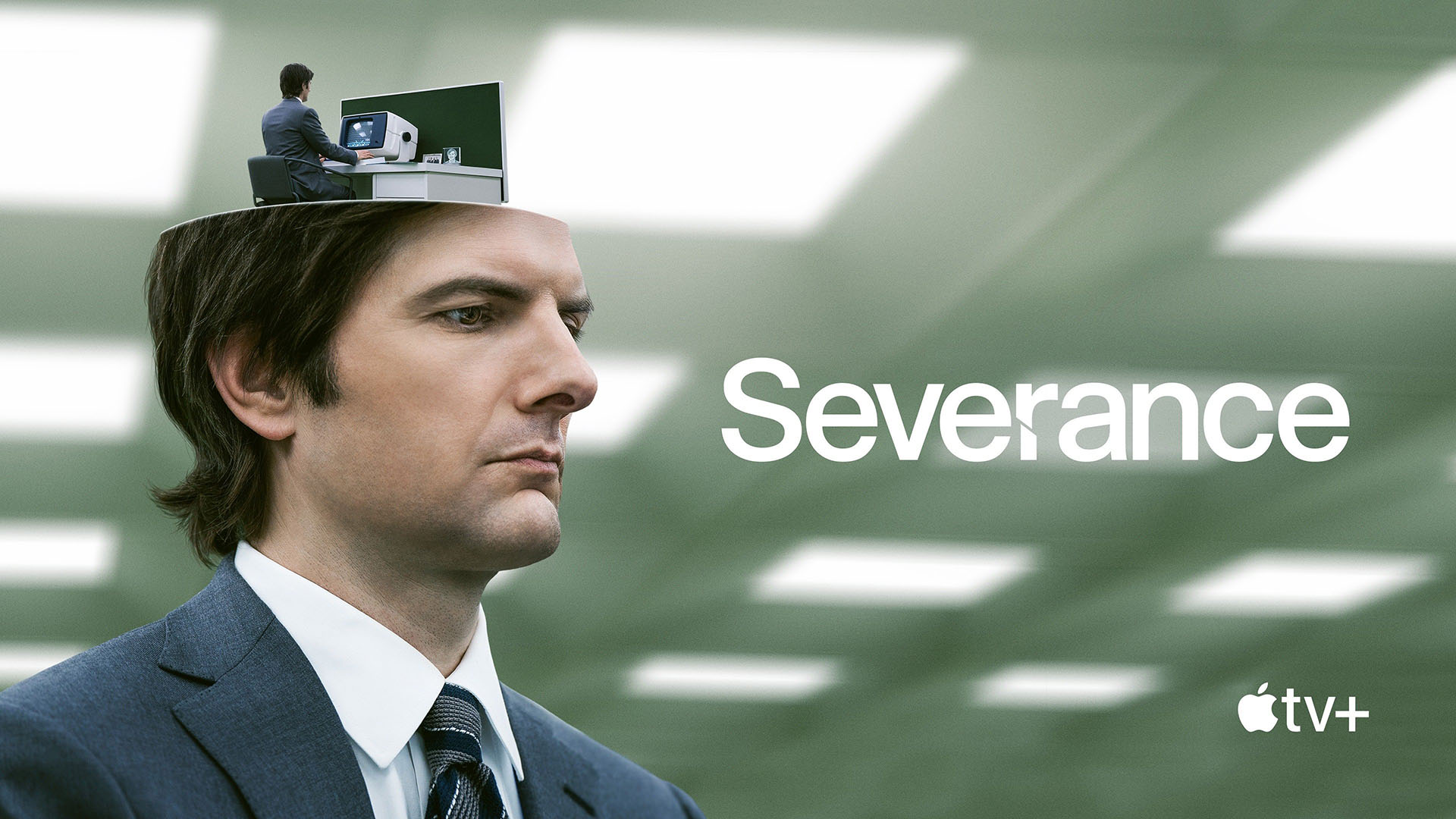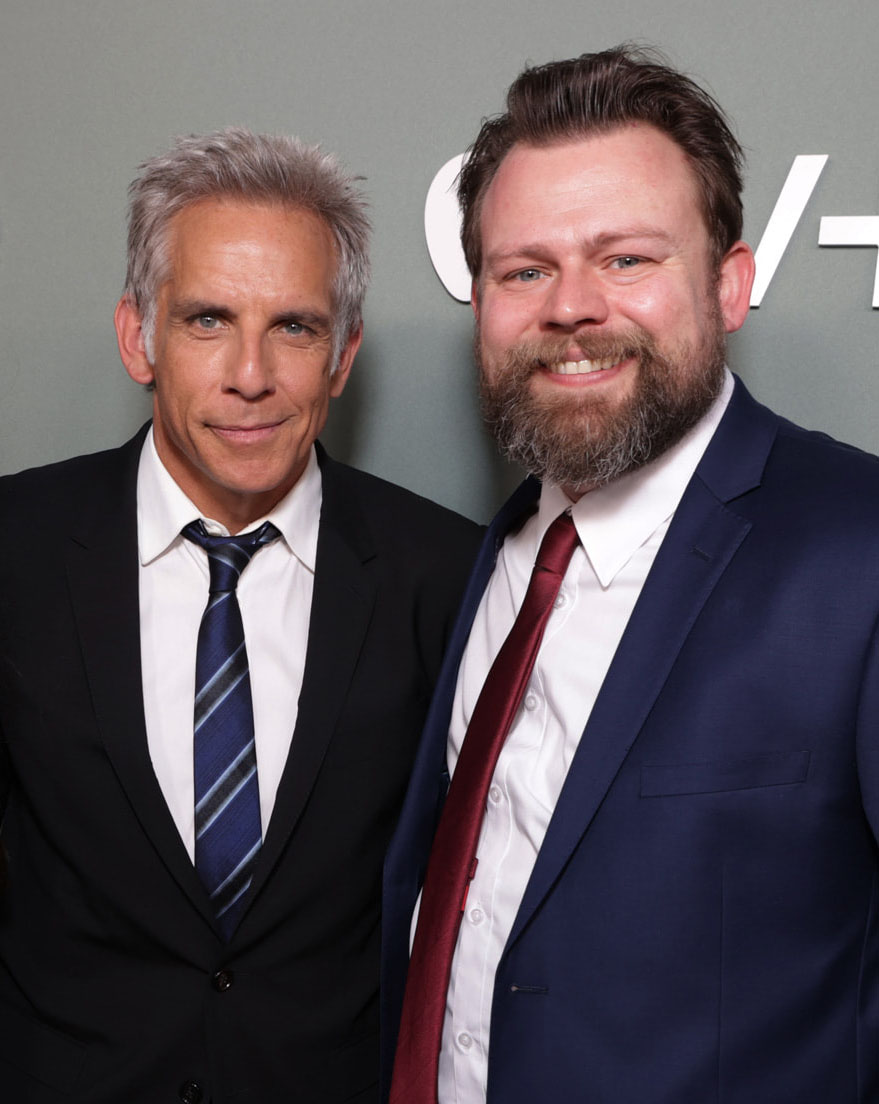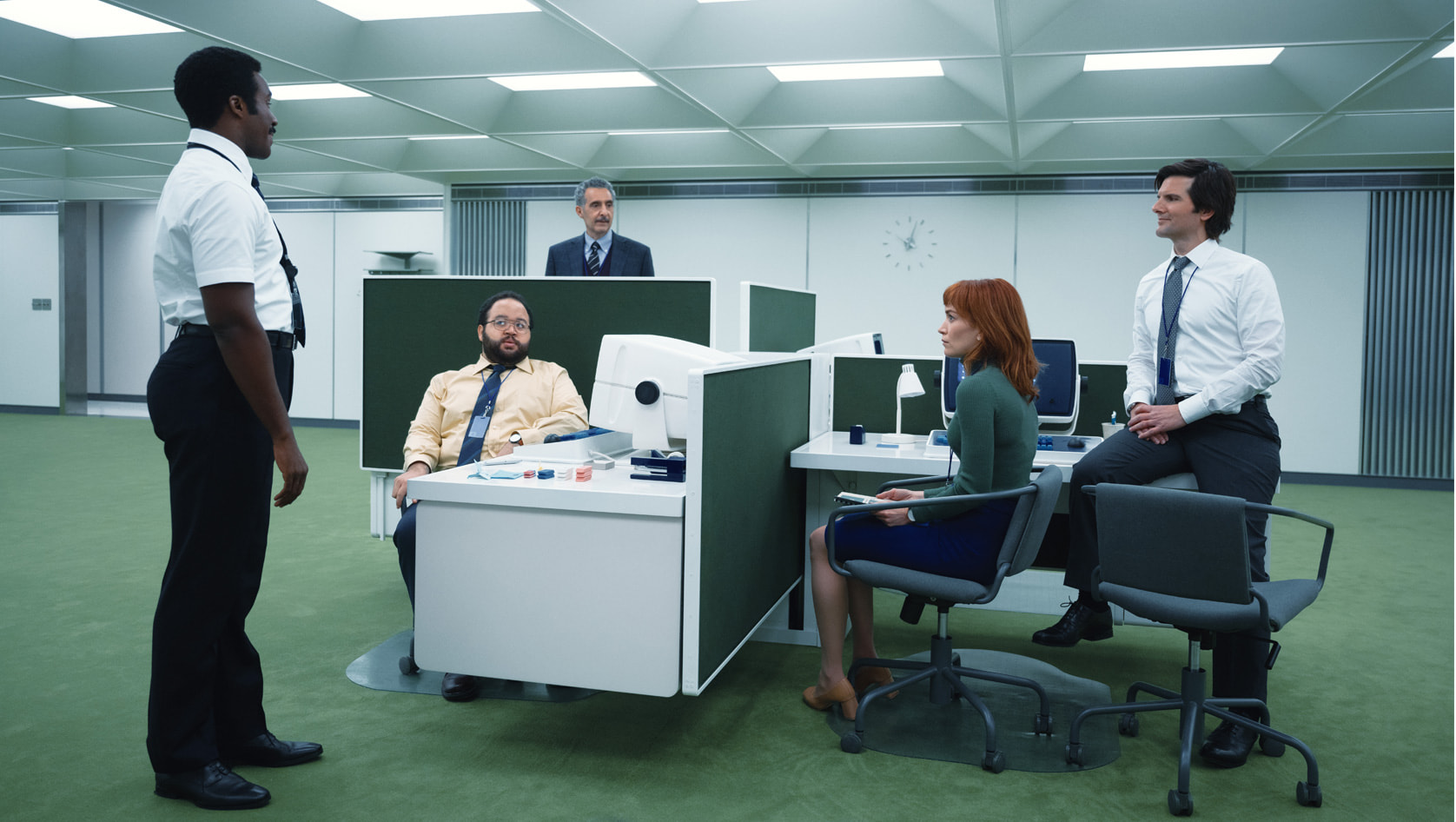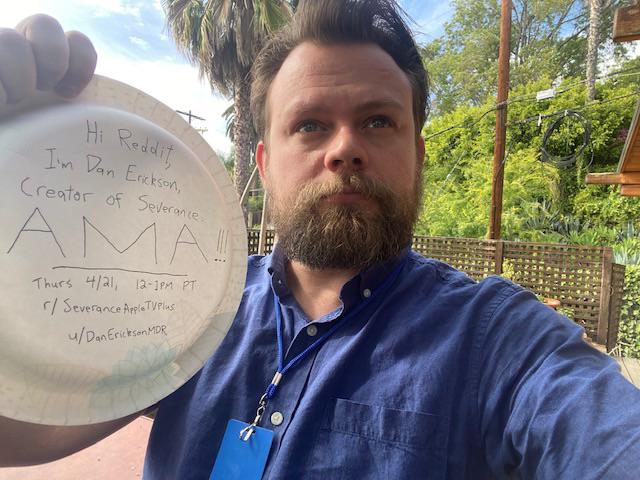When Dan Erickson ’10 (MFA, Goldberg Department of Dramatic Writing) moved to LA after graduating from Tisch, he found himself working temp jobs and wishing he could fast forward through the work day to leave and do what he actually wanted to do. He immediately realized what a troubling - and universal - desire it is to wish 8 hours of your life would disappear daily. It was that one thought that led him to begin writing what would one day become the new Apple TV+ smash hit, Severance.

Severance

Severance tells the story of a group of office workers whose memories have been surgically divided between their work and personal lives. The workers have no idea who they are outside of the office, and the people they are outside have no idea who they are, or what they do, on the inside. Since its premiere, Severance has received rave reviews from critics and audiences alike, sparked exciting fan theory discussions on Reddit, and has already been renewed for a second season.
In 2016, Dan's pilot script for Severance was recognized by BloodList, a genre specific version of the BlackList for horror and sci-fi scripts. In 2019, it was announced that Ben Stiller would executive produce and direct the series.
NYU Tisch Alumni Relations sat down with Dan to learn more about his time at Tisch, and how one idea nearly ten years ago sparked a TV phenomenon today.
Just to kick us off - can you tell us what brought you to NYU Tisch, and what your main focus was here as a student?
I went to Tisch on the recommendation of a professor I had had in undergrad, Bryan Willis, who was a really great playwriting teacher at Western Washington University where I went to school. I was talking to him about his path, and he had gone to Tisch some years earlier and had had a really great experience.
When I applied, I submitted a play called Convention that I had written at Western, partially under Brian’s tutelage - that script actually ended up containing a lot of the early DNA of Severance. So it’s this fun track that I’ve been on for a really long time now.
Where did the idea for Severance first come from?
You could say that the idea dates back to Convention. I had not yet ventured out into the corporate world, or really even the professional world outside of being a camp counselor. I think it was born out of my fear - I had this idea of the scary, amorphous corporate world that I was about to give myself over to entirely the moment I graduated college. Convention is about these guys who are stuck in this office and they slowly realize that they can’t remember ever leaving. It had a lot of the same beats and DNA [as Severance].
Upon moving to LA after graduation, I got a series of temp jobs, and one of them was at this company that made and repaired doors. It was a weird little windowless office - there were really nice people working there, and I got to know them and like them, but at the same time it wasn’t what I wanted to do. So I found myself walking into work thinking ‘I wish I could just jump ahead and have it be 5 pm and I would be leaving so I could do the things I want to do.’ I realized that’s kind of a screwed up thing to be wishing for. It’s troubling to think that you would give up some of your precious time on this earth because you’re so unhappy with what you’re doing during those hours.
That was really the genesis of this idea, and then I remembered Convention. The whole thing bloomed from there. It got reworked and reworked for years before it ever got to Red Hour and Ben Stiller’s desk, and from first draft to shooting script it’s like it’s almost an entirely different show. We kept the tone and the soul of it alive, but it’s very different in terms of what happens.
Throughout the series, there are moments of humor that bring levity to an otherwise unsettling story. What made these moments of humor so important for you to include?
It’s so important - I have a weird, specific affection for the line in Episode 9 where Patton takes the baby and he’s like “I found your child! I’m the one who found her!” because it’s funny and brilliantly delivered, but it’s also the last of those that we get. It’s the last moment like that before we’re all cast into the darkness that we’re now in, until I can get my act together and write season 2. It’s almost this little goodbye to the humor of Severance, before we go into the dark.
When I was at Tisch I was in the Half Hour Comedy TV Program, because I always assumed I was going to do comedy. That was around when stuff like Breaking Bad was coming out, where you started to get this exciting idea that you could dance across the genre line more than we’ve seen before - Vince Gilligan was a comedy writer!
I’ve never had any interest in writing something that wasn’t, to some degree, funny. I’ve always had a dark, weird sense of humor. But it’s also how I convey humanity and love, and it’s always been part of the language that I use to talk to the world.
It was natural to me that that would be how we come to understand these characters’ humanity - that they would pull us in and make us laugh, and that would help us to understand them and love them.
It really does make you feel like you know these people! My favorite line is when Mark teases his sister for buying three beds for her baby.
That relationship is based very much on my relationship with my sister - we have that sort of banter with each other. I have a younger sister and an older brother, and the Petey character is my sort of shout out to my brother and his humor style. I wanted Mark to have a sister on the outside and a brother on the inside.

'Severance', Episode 2, courtesy of AppleTV+
Three episodes into the season, I initially wondered if your intent was to encourage viewers to re-evaluate their work-life balances. Upon finishing it, I realized it’s so much more than that. Was your hope in crafting this story to give people a push to be more introspective about the many selves they may contain?
Yes. After having the idea, and even writing the pilot, my biggest worry was ‘Is this just a show about how we’re different people at work? Is that as deep as this goes? And if that’s the case, does it need to be a show, or can it just be a fun little short film?’
The reason I wanted it to be a show is that I realized that it could be about dissociation and segmentation more broadly, and how we become different people in many different factors in our lives. We’ll do something at work that we might never do in our personal lives, and vice versa. That expanded and even became about on a macro level how society segments us, how we segment ourselves, and how, with the internet, it becomes harder to see the big picture. Oftentimes, we only look at a small piece of the picture at any given moment.
The show asks the question - why do we do that? What is that human impulse, and on the scarier side - how can that be exploited? How can a company like Lumon, or any large entity, use that impulse and make us easier to control.
What was the moment like for you when you first found out that Ben Stiller was interested in developing your script?
REALLY weird. I had worked a little in the industry at that point, but when I heard about Ben, I was driving for Postmates and living with a couple in a small two bedroom apartment.
The script had been passed around a bit and had gotten on the BloodList, and then I got the call that Ben Stiller had read it and was interested in talking. I had admired Ben as a director since I was a kid - my parents let me see the Cable Guy as a kid, and I absolutely loved it. That movie stuck with me. I had never seen a movie like that, that was really scary but also so funny.
When I first met Ben, I was terrified. I had admired him for so long! But he was immediately really nice, and I was struck by how thoughtful he was. The thing that you maybe expect is, oh it’s this celebrity director - you know, he’s just going to come in and do the bare minimum and put his name on it. I knew that wasn’t Ben because I knew his work, but it immediately became clear to me that he is the exact opposite of that stereotype.
He was asking questions that were more in depth than I had thought about, having sat with the project for years at that point. It was clear he was going to push it to the next level. He wasn’t going to let it be anything less than the best it could be.

How has it been for you now that the show has gone viral?
It’s really humbling - it has the potential to be the opposite of humbling and go right to your head, but I’m trying not to let it. I’m still pinching myself that I got to meet Ben Stiller one time, and the fact that it kept going and actually got made and now is getting this response - it’s just crazy.
I think we knew in the writer’s room and when we were shooting it that we had something special that we were going to be really proud of. But I remember there being many moments where I thought “maybe it’ll just be five people’s favorite thing,” and just knowing that I would be proud of it regardless.
I was hopeful but I was definitely not expecting that it would break out and become something that people talk about for awards. It’s been really surprising and insanely fun that it’s being discussed on that level.
The best part though - I mean, it’s great to have good reviews, and I do check the Rotten Tomatoes score every day, as much as I’m ashamed to say it. But the best part is the fan art and the theory discussions on Reddit, which I was counseled not to check but of course check all the time. Just seeing the actual love that real people have for this, where they’re taking hours out of their day to make an awesome piece of art based on the show, that’s really hard for me to wrap my head around.
I’m still getting used to that, and I might never.
It seems like a good mental place to stay in, if you can!
[laughs] We’ll see what happens when they turn on me and eat me, sometime around season 4.
Were there any specific skills that you learned at NYU Tisch that you feel may have helped you in the process of writing to now producing the show?
It’s hard to define - I don’t want that to make it sound like there wasn’t a massive benefit, because there was, but it’s a funny thing learning how to write because it’s such a gradual process. A lot of it is about repetition - being made to write and re-write and re-write.
I did take a course called Writing With a Producer, which was a one-on-one where you would sit down and she would give you notes that were meant to simulate the process of working with a producer, and the types of things they might say to you. And I didn’t really like the class very much [laughs] because I found it extremely frustrating. But I will say that that class ended up being extremely helpful - the notes she gave were, if anything, a less insane version of a lot of the notes that I now get. That class prepared me for that process in a real way, and it would have been harder for me to hit the ground running had I not learned how to do that at Tisch.
When you’re in the middle of an education it’s hard to see the overall, to see what you’re getting out of it. But then you look back after it’s over, and you look at the work you did before you got there, and you’re - wow. In my case, my work became so much more honed, I developed a better vocabulary, and I became better able to organize and streamline the raw ideas that I had before Tisch.
For aspiring Tisch writers and showrunners, do you have any advice for them on how to get their stories noticed?
I always try to be cautious with this question - there’s a confirmation bias, because what I did worked for me. And a lot of that was luck. I happened to meet the right person on the right day, and I don’t want to give too specific of advice to someone and draw someone away from their path that might work for them.
The way that I came up with Severance is that I just noticed a messed up thought I was having, and I thought “Is there a way to dramatize this? Can I make a story around whatever that weird, human idiosyncrasy is?”
They say to start with a $5 idea, and then ask yourself, what’s the $20 version of that idea? What’s the $100 idea? To me, that’s how you build a high concept, is starting small and human and trying to find the story in that.
Having said that, Severance has been the only time that’s worked for me! You can be the best writer in the world, but if you don’t have something that can be boiled down into a two or three sentence pitch… it’s just hard. I know so many amazing writers who are still trying to find work because it’s so hard to make something that sticks out.
It’s also about having a network. I got my manager through a friend who was a classmate of mine at Tisch. There was a staged reading my year for all of the writers who moved out to LA. They invited reps and my classmate indirectly met my now manager through that.
So that’s what I’ll say - take advantage of the fact that you’re a Tisch graduate. Wherever you go, try to stay in touch with your classmates, hold kick off events for your work - that stuff can work! We’re used to thinking of it not working, but it can!
Those are all of the questions that I had, so unless you have any Season 2 spoilers you want to reveal…?
I think if I did that, you would just never hear from me again. It would come out that I “slipped on a banana peel.” So… [laughs], no. ⧫